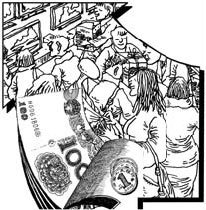
Premier Wen Jiabao expressed optimism about China's ability to battle the impact of the current global economic crisis and emphasized the importance for the world to maintain confidence against the crisis during his recent European tour.
The Chinese leader's confidence was not groundless. The brisk shopping in consumer markets throughout cities and rural areas in the past "golden week" of Spring Festival was the best evidence of such confidence. According to the Ministry of Commerce, Chinese people spent a total of 290 billion yuan ($42.6 billion) shopping for the lunar new year celebration.
More noteworthy is the fact that the spending was a 13.8 percent growth on the basis of the same period of last year although the global recession is also felt in this country. The optimistic mood was also demonstrated by more than 100 million tourists who traveled to domestic and foreign destinations during the seven days.
Admittedly, China is also suffering from the impact of the global crisis. Reduction in foreign orders for Chinese products has left thousands of Chinese plants shut down and millions of workers jobless. Then why are Chinese people still so optimistic? Are they numb before the looming threats?
Chinese people are definitely not engrossed in a mood of blind optimism. They know the latent hazards; but they have not lost their basic confidence.
This confidence stems from their understanding that the essential elements of China's economy have not changed and the development mode they have chosen in the 30 years of reform and opening-up drive has not changed.
And the victories they achieved in 2008 overcoming the difficulties brought along by the unprecedented snow storms in January and earthquake in May and the successes of the Beijing Olympic Games and Chinese astronauts' space-walk all enhanced their confidence.
Although they have complaints, as all people throughout the world do, the Chinese people have confidence in the government's ability to lead them in fighting the economic adversities.

This phenomenon may merit some thoughts on the part of certain Western politicians who always blame China from ideological perspectives.
Why does a country adopting a social system diametrically different from the liberal capitalism they worship the most demonstrate a stronger confidence in the face of the worst economic crisis in seven decades?
Why was a government which so often interferes in the market so successful in maintaining a fast economic growth for so many years?
Why does a country that emphasizes collectivism more than individualism win such a strong trust from its people?
In his speech delivered at Cambridge University on Monday, Premier Wen said: "This once-in-a-century financial crisis is truly thought-provoking. It reminds us of the need to have serious reflections on the existing economic systems and theories."
He was right. Many Western economists have also begun to reflect on the drawbacks of the extreme liberal capitalism. In fact, the measures adopted by Western governments recently to bail out their battered economies were exactly administrative interference against the "intangible" market force - the core value of liberal capitalism.
Different countries have different national conditions. What is successful in one country may not apply to others. Therefore, to battle the current world crisis, as Wen suggested, "countries should, first and foremost, run their own affairs well and refrain from shifting troubles onto others".
E-mail: liushinan@hotmail.com
About the author:
刘式南 高级编辑。1968年毕业于武汉华中师范学院(现华中师范大学)英文系。1982年毕业于北京体育学院(现北京体育大学)研究生院体育情报专业。1982年进入中国日报社,先后担任体育记者、时政记者、国际新闻编辑、要闻版责任编辑、发稿部主任、《上海英文星报》总编辑、《中国商业周刊》总编辑等职。现任《中国日报》总编辑助理及专栏作家。1997年获国务院“特殊贡献专家政府津贴”。2000年被中华全国新闻工作者协会授予“全国百佳新闻工作者”称号。2006年获中国新闻奖二等奖(编辑)。
